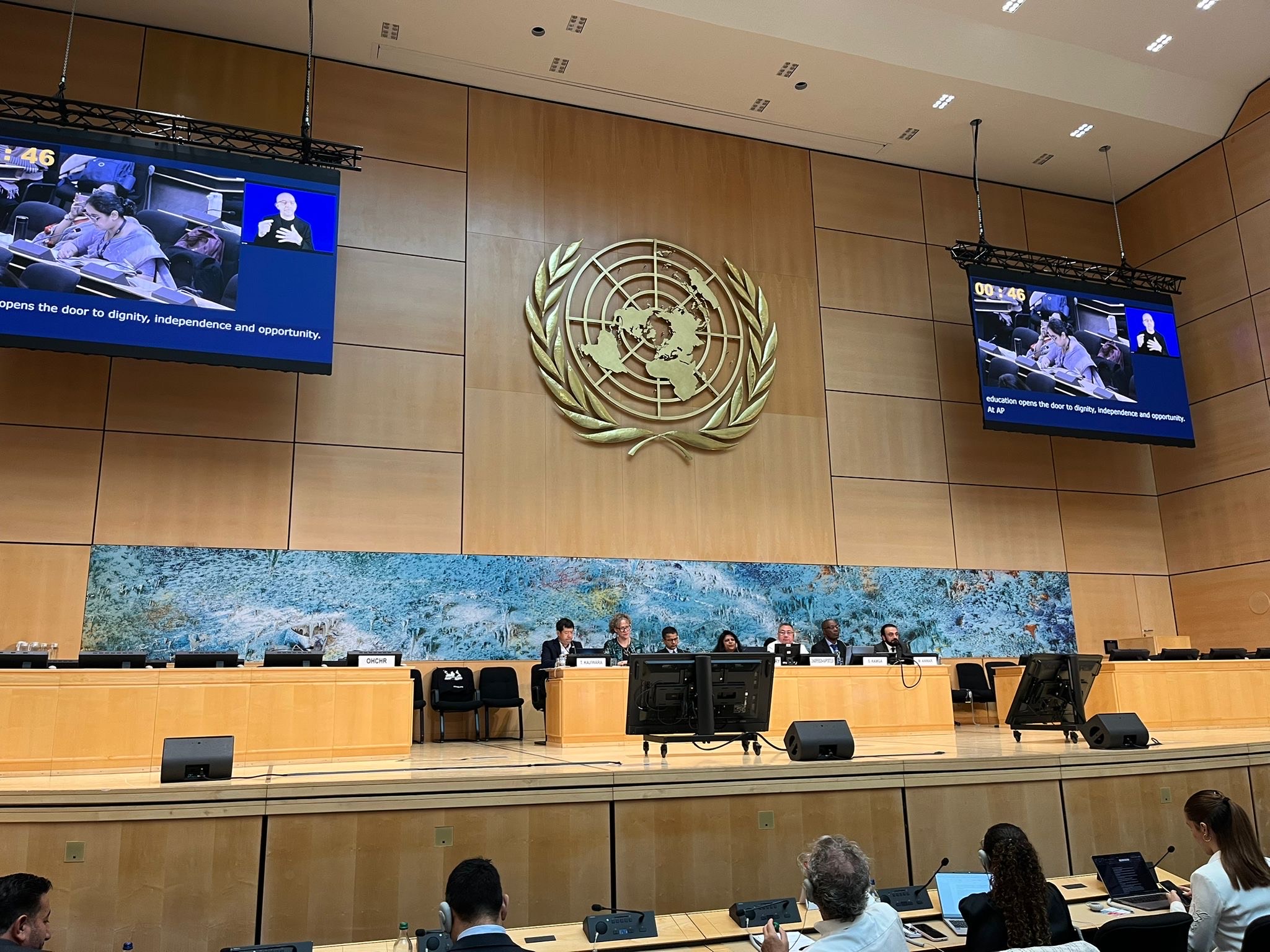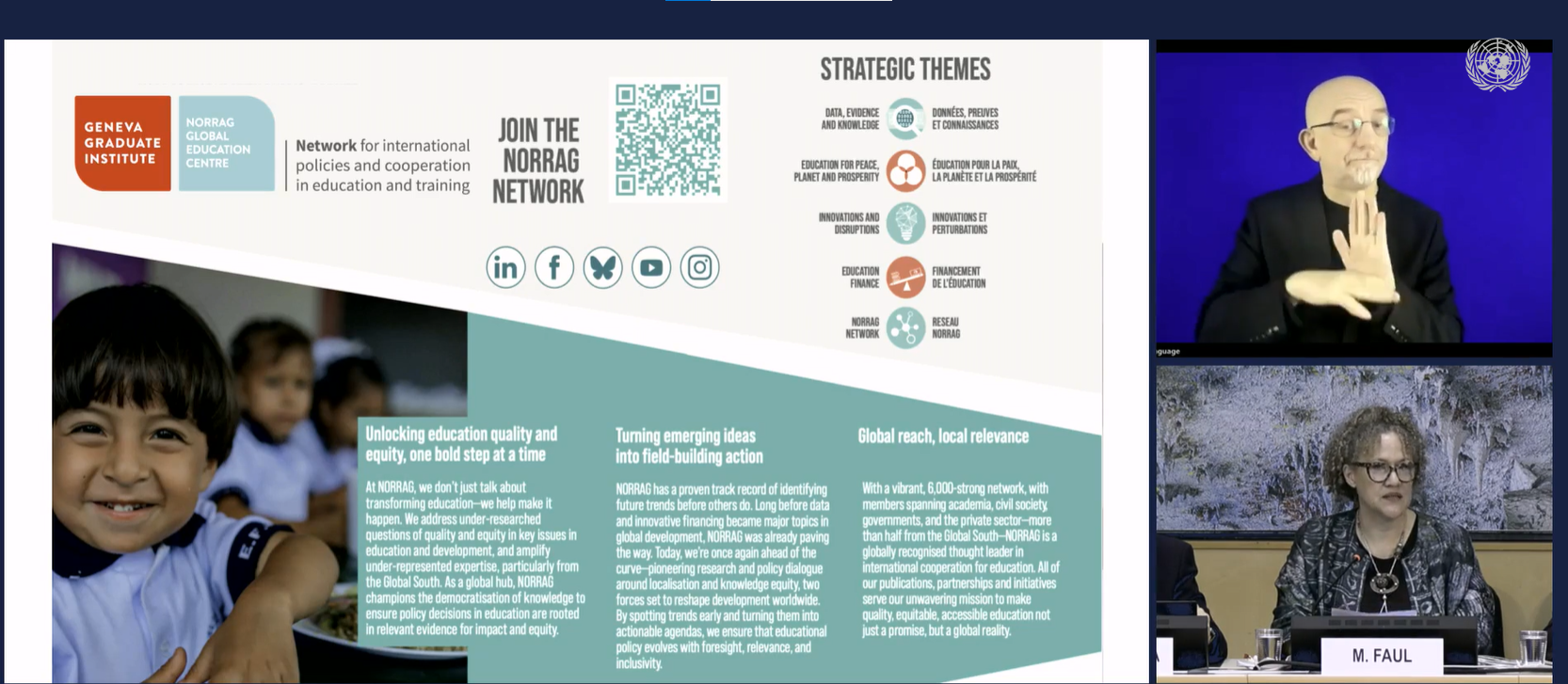Event Highlights: 2025 Human Rights Council Social Forum
Date: 30 – 31 October 2025
Location: Assembly Hall, Palais des Nations, Geneva
2025 Social Forum
The 2025 Social Forum took place on 30 and 31 October in the Assembly Hall, Palais des Nations, Geneva. In accordance with resolution 56/12 of the Human Rights Council, it focused on the contribution of education to the respect, promotion, protection and fulfilment of all human rights for all.
Roundtable on Education for Socio-Economic Rights – Participation in Socioeconomic Life, Well-Being and Care, Fair Distribution of Benefits, Resources and Opportunities
On 31st October 2025, Moira Faul, Executive Director of NORRAG, presented in the Roundtable on Education for Socio-Economic Rights-Participation in Socioeconomic Life, Well-Being and Care, Fair Distribution of Benefits, Resources, and Opportunities.
NORRAG’s message was clear. Quality education (SDG 4) is a fundamental human right. Moira Faul stressed that education is far more than a right in isolation; it is the most powerful means we possess to achieve the ambitious vision outlined in the 17 Sustainable Development Goals.
Moira Faul brought to the attention that education remains central in prompting healthy economies by providing youth with the necessary skills for work, innovation, and sustaining productivity. That is to say, investing in education, particularly in low-income contexts, is investing in healthy economic growth. Similarly, education improves health outcomes by increasing access to information, promoting healthy behaviours, and empowering individuals. Furthermore, education has the profound ability to reduce inequalities by providing equal access to opportunities and resources. Lastly, in crisis settings, education not only fosters respect for human rights and the rule of law but also provides a lifeline and a pathway to social reintegration.
Coupled with a drop in global aid to education, Moira Faul reminds us that to reverse this trend and fulfil existing commitments to support economic and social rights, we must champion increased international aid and domestic resource mobilisation; however, both of these depend on changing the rules that govern international tax and illicit financial flows. To provide education that truly supports the achievement of the SDGs and fulfils economic and social rights, she suggests that we must listen to young people and children to understand and then fulfil their needs in this rapidly changing world. Secondly, we must build and sustain peace to allow for the circumstances in which we might deliver quality, equitable, accessible education.
In conclusion, she emphasised that in times of crisis, cooperation becomes a way forward. Thus, unleashing education’s full power rests on sustained cooperation. Therefore, there is an urgent need to address the challenges in education finance.
The event recording is available on UNTV
Side Event: Enhancing the Right to Education: Emerging Challenges and Enabling Factors
We were joined onstage by:
Peter Larsen, Faculty of Social Sciences, University of Geneva and member of the Swiss Commission for UNESCO
Ana Luiza M. Thompson-Flores, Director, UNESCO Geneva Liaison Office
Peggy Hicks, Director of the Thematic Engagement, Special Procedures and Right to Development Division, UN Human Rights Office (OHCHR)
Margaret Grogan, Chief Editor of Frontiers in Education, Frontiers Journal
H.E. Mrs. Claudia Fuentes Julio, Ambassador Extraordinary and Plenipotentiary, Permanent Representative of Chile to the United Nations Office
H.E. Mr. João António Mira Gomes, Ambassador, Permanent Representative of Portugal to the United Nations Office
H.E. Mr. Sambue Antas, Ambassador, Permanent Representative of Vanuatu to the United Nations Office
Delphine Dorsi, Director, Right to Education Initiative
Patrice Meyer-Bisch, UNESCO Chair for Human Rights and Democracy and President of the Observatory for Diversity and Cultural Rights, University of Fribourg
Sangheon Lee, Director of the Employment Policy Department, International Labour Organization (ILO)
Manon Sala, PhD student in Education and Sociology, Learning Planet Institute
Georges Felouzis, Honorary Professor, Faculté de psychologie et des sciences de l’éducation, Université de Genève
Kevin Mary & Nora Nafaa, Université Perpignan Via Domitia & Université d’Aix-Marseille
Rita Locatelli, UNESCO Chair in Education for Human Development and Solidarity among Peoples, Università Cattolica, Milan, and Co-editor in chief of L’éducation en débats : analyse comparée
Rolla Moumné Beulque, Right to education, UNESCO


